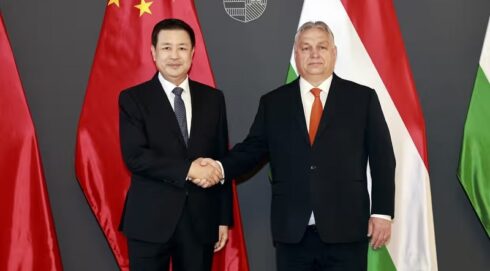Written by Ahmed Adel, Cairo-based geopolitics and political economy researcher
China’s Public Security Minister Wang Xiaohong met with Hungarian Prime Minister Viktor Orbán during a visit to Budapest on February 19 and offered support on public security issues and expressed his hope that such efforts would be “a new highlight of bilateral relations” in areas such as combating terrorism and transnational crimes. However, even before the statements were made by Xiaohong, the US Ambassador to Budapest had already expressed his alarm about the growing Chinese-Hungarian ties.
The commitment would strengthen security and law enforcement capacity under the Belt and Road Initiative, the Chinese minister was quoted as saying by Reuters. Wang also met with Hungarian Interior Minister Sándor Pintér and signed agreements on law enforcement and security cooperation, including an agreement on “joint patrolling,” the outlet said without providing further details.
China’s security guarantees come as Hungary has sought to assert its independence from Western countries over the past decade under Orbán.
At the same time, Hungary is currently home to Huawei’s largest logistics and industrial base outside China, despite warnings from the European Commission that the telecommunications giant poses a risk to EU security. Budapest will also soon welcome Chinese automaker BYD, making it the Chinese company’s first unit in Europe.
Although Hungary is a member of NATO and the EU, Budapest has repeatedly clashed with the European bloc over its opposition to financial and military support for Ukraine. At the same time, Hungary has not yet given the green light to Sweden’s application to join the military alliance.
The Central European country’s growing affinity with Beijing has already put a barrier in the EU’s collective front, Reuters highlighted, adding that the security pact with Hungary represents a diplomatic victory for China in the EU at a time when the bloc assesses its ties with the Asian giant in all areas.
US Ambassador to Hungary David Pressman expressed earlier this month Washington’s concerns about Budapest’s “unusual” ties with Beijing. It is recalled that Pressman is unfavoured by Orbán, especially after making accusations that Hungary is exposed to “corrosive corruption risks” after the Hungarian leader “enthusiastically pursued a relationship with the Chinese Communist Party.”
“The United States does business with China. Hungary does business with China and should do business with China … Everyone does business with China, that’s not the issue,” Pressman said to Politico. “The issue is the opaqueness of the relationship — the use of state tools, including classification authority, to render the relationship more opaque rather than more transparent.”
Pressman said, days before the security deal was signed, that Hungary and China share a “political relationship that is unusual amongst allies” and that “The way they’re dealing with China is different than others, and it’s a focus of ours in conversation with the Hungarians, trying to ensure that the risks posed that are well-documented… are also understood here.”
The Biden-appointed diplomat also lambasted Hungary for being one of the first EU member states to join the Belt and Road Initiative, the only member state not to join the Trump administration’s Clean Network initiative, and for hosting the largest Huawei facility outside of China.
Missing from Pressman’s blasting of Hungary – on this occasion – and the true source of US frustration is Orbán’s unrelenting opposition to the West’s self-destructive policies regarding Ukraine. Pressman has certainly not been shy in his criticisms of Orbán, even accusing the Hungarian leader in December 2023 at a gathering of business leaders at the American Chamber of Commerce of embracing Russian President Vladimir Putin.
“[Hungary] relies upon its NATO allies but feels comfortable disregarding the interests of those same allies and our alliance, including during a time of war in Europe. That disregard is evident when the prime minister embraces Putin when his government threatens to hold up crucially needed aid to its neighbour, Ukraine, while Ukrainian men, women, and children are murdered by war criminals.”
With Pressman using bombastic language far removed from the truth whilst also dismissing Budapest’s concern for the welfare of Ukraine’s Hungarian minority, which is persecuted by the Kiev regime, and the economic suicide Europe is committing for the sake of ineffective sanctions on Moscow, it is little wonder why Orbán is taking unprecedented moves to look beyond NATO for security.
What caught everyone by surprise, though, including Pressman, was the fact that Budapest is pursuing a security relationship with China. Seeing as China has ended the US’ stranglehold on the global economy, it now has greater capabilities to expand its military. Effectively, China will also be the US’ greatest threat to imposing hegemony over not only Asia but the whole world, and even though Hungary is just a minor economic and military player, Orbán’s unprecedented action is causing fear in Washington as it has the potential to create greater fractures in NATO.







uk has ties with china too.. see how british wanted huawei to install 5g in uk.. it seems also that “uk + china” team has displaced france in niger
ungarn ist das einzige normale land in der eu. alle anderen sind linksgrüne faschisten die einen totalitarismus anstreben, wie ihn der stalinismus und nationalsozialismus hatten.
https://www.youtube.com/watch?v=xjpxcr60tfe
no video anymore….
americans are annoying and obnoxious. so it’s okay for the us to trade with china, but not okay for hungary to trade with china? and so what if hungary buys defense equipment from china? americans sell defense weapons to taiwan!
brics should create their own military alliance and take hungary and turkey in.